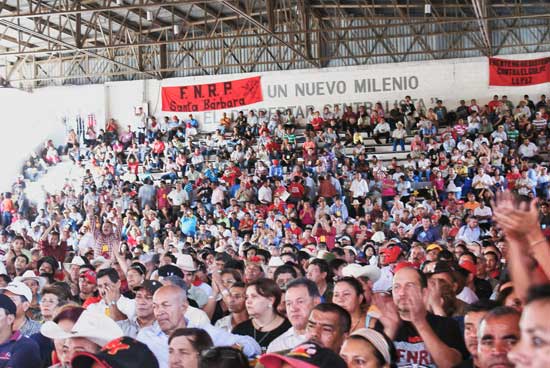PART 1
National Front for Popular Resistance in Honduras holds delegate assembly
By
Heather Cottin
Tegucigalpa, Honduras
Published Mar 12, 2011 10:25 AM
The National Front for Popular Resistance (FNRP) in Honduras held a national
assembly in capital city Tegucigalpa on Feb. 26 and 27. Some 1,500 delegates
represented the 18 municipal departments in Honduras and the country’s
“19th department,” members of the Honduran diaspora around the
world. Three members of the International Action Center’s Latin
America-Caribbean Solidarity Committee attended: two observers and an elected
delegate from the Honduran diaspora.
At a meeting two days before the assembly, to which the IAC Committee was
invited, FNRP subcoordinator Juan Barahona told us the National Assembly for
Popular Resistance must focus on three things: “unity, unity and
unity.” During the assembly on Feb. 26, he said that the group’s
goals were “holding a national constituent assembly, returning [exiled
President Manuel] Zelaya to the country and taking political power to transform
Honduran society.” (Washington Post, Feb. 26)
This was a democratic assembly, filled with debate and passion. The key issue
was whether the FNRP would participate in elections in 2013. The majority voted
not to participate. The FNRP did not say it would never participate in
elections, but that they plan to organize in their own way.
A delegate described the “ocean” of people there: “This great
multitude starts from the little creeks in the mountains, which feed into big
streams in the hills and tumble into rivers in the valleys to pour into the sea
of popular resistance in Honduras.”
The call for unity encompasses diverse communities in Honduras, including
lesbian, gay, bi, trans and queer communities and women, the Afro-Honduran
Garifuna community, Indigenous peoples, peasants, union leaders, workers
including teachers and lawyers, youth and students, small business owners,
intellectuals and more. Waving yellow identification cards, delegates voted for
resolutions to promote just inclusion and representation. They analyzed the
objective conditions and planned to develop, in regional assemblies around the
country, the necessary strategy and tactics to confront the oligarchy and its
defenders. And they voted for Zelaya to serve as coordinator of the FNRP.
The present is history
Almost two years ago, on June 28, 2009, the Honduran military kidnapped Zelaya
from his home at the behest of the country’s oligarchy. They took him out
of the country through the U.S. military airbase at Palmerola in Honduras.
Though Zelaya was a man from the wealthy class, as president he was convinced
by union and peasant leaders to work to improve conditions in Honduras, the
poorest country in Central America. These leaders showed him how neoliberal
privatization schemes were impoverishing Honduras.
Zelaya listened, promoting agrarian reform and environmentalism and raising the
minimum wage. Zelaya wanted to turn the Palmerola airbase, from which the U.S.
military dominates Central America, into a civilian airport. He began to talk
of taking Honduras out of the U.S.-imposed Central America Free Trade
Agreement, which was economically crushing the region’s farmers and
workers. He planned to have Honduras join the Bolivarian Alliance for the
Peoples of Our America (ALBA), which promotes social, political and economic
integration among the countries of Latin America and the Caribbean.
Because the country’s 1982 Constitution favored foreign investors and the
oligarchy, Zelaya’s government planned a vote to be held on June 28,
2009, which, if passed, would take steps toward creating a new constitutional
assembly. Instead, that morning the military took over. Wikileaks documents
show U.S. government participation.
The resistance was born. For 214 days, thousands of fearless resistance members
poured into the streets of every city and department in protest. The army and
police fought the people with guns, tear gas, water cannons and truckloads of
troops. Zelaya himself came back secretly, taking refuge in the Brazilian
embassy.
The U.S. government set up a phony election administered by the
“golpistas” (coup plotters) on Jan. 27, 2010. Pepe Lobo Sosa became
president and the oligarchy stayed in power. With the help of their rich Uncle
Sam, a dozen wealthy families still run the country. All of Zelaya’s
reforms have been canceled.
The U.S. government calls Honduras a “democracy” and ignores the
growing poverty, murders and torture of hundreds of peasants, LGBTQ people,
women, unionists, Indigenous people, teachers, journalists, Garifuna people and
youth activists. These are the martyrs of the resistance.
At the National Assembly for Popular Resistance, speakers denounced the
immunity the Lobo government tacitly grants to perpetrators of these crimes.
The FNRP dedicated the assembly to the martyrs and vowed to build real
democracy in Honduras.
Articles copyright 1995-2012 Workers World.
Verbatim copying and distribution of this entire article is permitted in any medium without royalty provided this notice is preserved.
Workers World, 55 W. 17 St., NY, NY 10011
Email:
[email protected]
Subscribe
[email protected]
Support independent news
DONATE


